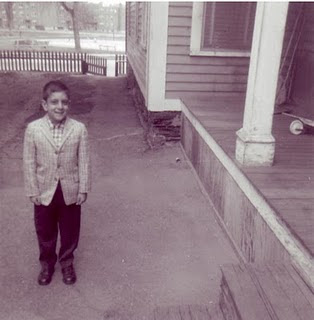
The Year in Poetry: One man's provincial perspective.
Doug Holder
Well-- I am writing this from my small table in the corner at the Sherman Cafe in Union Square. And I am writing with my gimlet eye fixed on the poetry world in Somerville and just beyond. I am not writing about the luminaries of the literary world: the Ploughshares, The Paris Review, the new schools, the latest trends, the much lauded retreats, you know the drill. I am writing for the most part about the everyday folks in my world who engage literary pursuits on the grassroots level.
I am writing about poet Kim Triedman who edited the acclaimed anthology "Poets for Haiti." Triedman tells me that all proceeds from the sale of this anthology will go to benefit the people of Haiti. I am writing about Tom Daley, poetry workshop guru who created a one man show about Emily Dickinson that was a hit at the Concord Poetry Center. I am writing about Chad Parenteau who runs the Stone Soup Poetry Series and keeps the tradition that the late Jack Powers started alive and well. I am talking about Deborah M. Priestly and Tom Tipton, who run the Open Bark Series at the Out of the Blue Gallery, and have been a supporters of poets and poetry for many years. I am going to mention my pal Sam Cornish, the first Boston Poet Laureate, who continues to pound the pavement in nursing homes, schools, hospitals, to bring the word to the people. My friend, and co-founder of the Somerville News Writers Festival, Timothy Gager, still heads the Dire Reader Series from the Out of the Blue Gallery in Cambridge and has had a prolific output of the best area poets and writers in town. This venue has been going on close to a decade! Gloria Mindock, the founder of Somerville's Cervena Barva Press produced a slew of poetry books this year (with the help of her loyal partner Bill Kelle) from their small nook of a place in Union Square. Marc Goldfinger, the poetry editor of Spare Change News, publishes a long-running poetry column that brings poetry from the street for you to meet. Marc is a great poet as well-and many are grateful for his long and hard work in the poetry community.
Shall I mention the Bagel Bards? Damn right I will. This iconoclastic group of poets, writers, poseurs, stumble bums, and publishers are going into their 7th year and still meet every Saturday morning at the Au Bon Pain in Davis Square, Somerville.
My buddy Harris Gardner, continues to come up with great poetry venues. Gardner has started a poetry venue at the Liberty Hotel ( Formerly the Charles St. Jail), a stone's throw across the Charles River, and is starting yet another one at the Arts Amory in Somerville the "First and Last Word" series with his pal Gloria Mindock. And least I forget-- Molly Lynn Watt warms our world with her Fireside Reading Series in North Cambridge, Mass.
Oh--how about the magazines? I am not going to mention the Boston Review,Harvard Review and Agni, and their ilk--sorry. They get enough play. And we know-every dog has its day. So how about the Wilderness House Literary Review, headed by Steve Glines? Or the Somerville-based Istanbul Literary review edited by Gloria Mindock and Susan Tepper? There is a new magazine I noticed in town the "Inman square Review"--it may be the magazine for you. And of course the little treasure out at Endicott College in Beverly, Mass. the "Endicott Review" of course.
And those book reviewers--I love them. I am talking about the ones who write for the online blog Boston Area Small Press and Poetry Scene. Folks like Irene Koronas, Barbara Bialick, Zvi Sesling, Rene Schwiesow, Paul Steven Stone, Lo Galluccio and others have reviewed hundreds of books from the vast world of the small press.
Of course I have to mention my own press (Ibbetson Street Press) and magazine that has been publishing in these parts since 1998. We are pleased to be affiliated with Endicott College in Beverly, Mass. This is a great break for Ibbetson Street! I want to thanks professor and poet Dan Sklar for his efforts in our behalf as well as Chairman of the Humanities Mark Herlihy and Dean of Arts and Sciences Peter Eden.
Also--to the staff at Ibbetson, my fedora is off to you: Dorian Brooks, our managing editor, Poetry editors: Mary Rice/Harris Gardner, Website/ Linda/Ray Conte, Steve Glines/ Designer, Arts Editor/ Richard Wilhelm and Consulting Editor/Robert K. Johnson/.
And how about The Somerville News? What newspaper do you know that consistently publishes a poetry column ( Lyrical Somerville) and a substantial literary page? Not many, pal. Thanks Donald Norton, Billy Tauro, Cam Toner, Bobie Toner, George Hassett, for your support!
Bert Stern and Tam Lin Neville over on Quincy St. in Somerville continue to run the Off the Grid Press for you folks over 60 who have a hot poetry manuscript in your hand. A lot of local folks I know have put out new poetry books including: Zvi Sesling, Ruth Kramer Baden, Tam Lin Neville, to just give you the tip of the poetry iceberg.
Some many more out there to mention--but as always--words fail--- in any case Happy New Year!



























































